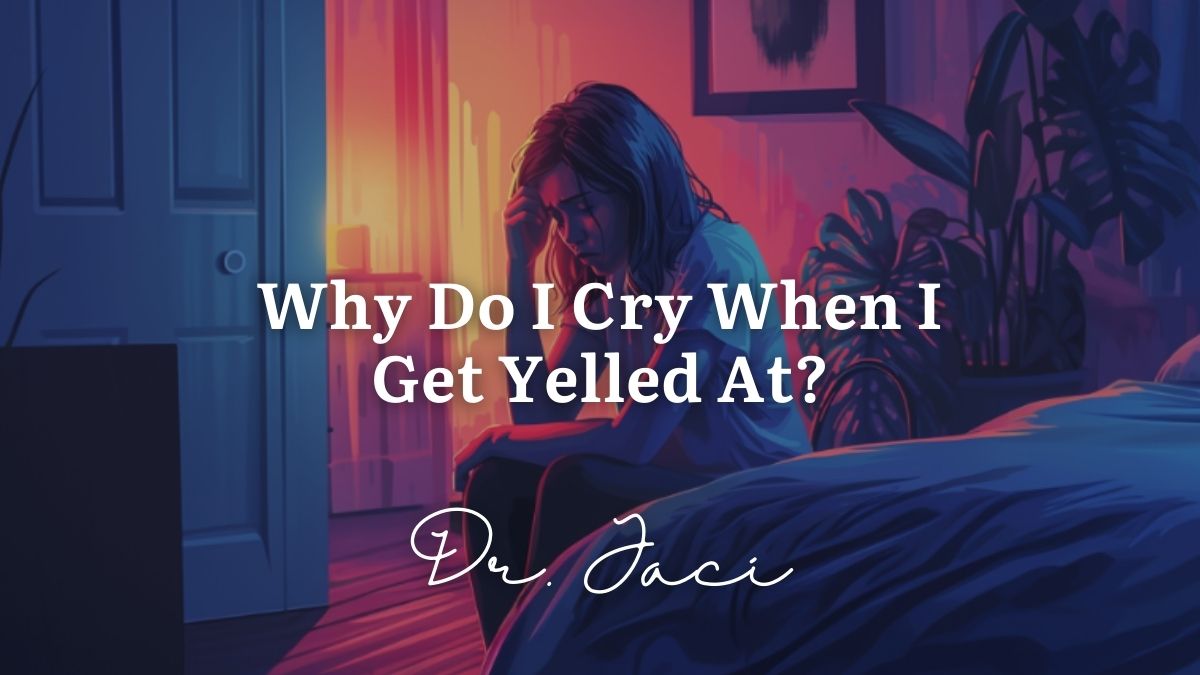If you’re wondering to yourself, why do I cry when I get yelled at, you’re not alone.
Yelling can evoke strong emotions like sadness, anger, and distress.
Many of us have experienced crying or losing control when someone raises their voice in criticism or anger.
This instinctive reaction is the body’s way of responding to the stress and perceived threat set off by yelling.
In this post, I will explore why we may cry when yelled at, the psychological impact it can have, coping techniques, and when to seek professional help.
Understanding Emotional Responses to Yelling
As a clinical psychologist, I often encounter clients with strong emotional reactions when someone yells at them.
Crying in response to yelling is a natural reaction for many people.
When we feel threatened or criticized harshly, it can bring up feelings of shame, hurt, and shock that lead to tears.
Crying helps us release some of the overwhelming stress and tension that builds up when being yelled at.
The Emotional Impact of Being Yelled At
Being the recipient of yelling can be highly distressing. It may evoke emotions like sadness, anxiety, anger, humiliation, and defensiveness.
The intensity and volume of yelling triggers our fight-or-flight response, releasing stress hormones that cause strong feelings.
If we don’t find a healthy outlet for these emotions, they can linger and cause mental health issues over time.
Psychological Effects of Yelling

How Yelling Triggers Emotional Reactions
When someone yells, the loud volume and aggressive tone tend to put us on high alert.
We may feel under attack, unsafe, or fearful, even if that was not the intention.
Our brains are hardwired to interpret yelling as a sign of an impending threat.
This automatic response kicks our emotions into overdrive.
Long-Term Psychological Consequences of Yelling
Being frequently yelled at can chip away at our self-esteem, performance, and mental wellbeing.
Studies show it can contribute to issues like anxiety, depression, difficulty concentrating, and emotional dysregulation.
In childhood, verbal abuse like yelling can even alter brain structure and function.
Setting healthy boundaries and limits on yelling is important.
Coping Mechanisms for Emotional Outbursts
Strategies to Control Tears When Angry
If you tend to cry when someone yells at you, try taking deep breaths, focusing on your values, and walking away if possible.
Bringing conscious awareness to your physical reactions can help you feel more in control.
Reframing the situation in a more positive light may also help deter an emotional outburst.
Your tears are not something to be ashamed of, but rather a natural alert that your nervous system is flooded.
Reframing this reaction as helpful biological signaling can start to reduce any shame or frustration you feel about your emotions.
When you find yourself getting flooded, pause and focus on taking some deep centering breaths.
Benefits and Drawbacks of Crying in Anger
Crying can help release pent-up emotions and restore emotional equilibrium.
However, it may also reinforce yelling if the person seeks that response.
Staying calm and addressing the underlying issue is often more productive.
Everyone is different – accept your reactions while working to develop coping strategies.
Managing Reactions to Yelling

How to Respond Calmly When Yelled At
It’s challenging, but replying gently and asserting boundaries can help diffuse the situation.
For example, “Please don’t yell. I’m here to listen when we can speak calmly.”
Deep breathing and focusing on your core values are also helpful coping skills when being yelled at.
If you feel too activated to respond calmly in the moment, that’s understandable too.
Consider saying “I need some time to process this. Let’s revisit this conversation when we can speak respectfully.”
Removing yourself until the height of emotions has passed shows great maturity and prioritization of mutual understanding.
The key is realizing that the other person’s inflammatory reaction says more about their emotional patterns than your worth.
Techniques to Prevent Crying When Being Yelled At
Prepare yourself mentally for a yelling situation by centering yourself and detaching emotionally.
Consider if you need to remove yourself.
Staying grounded, breathing slowly, and repeating a mantra like “This will pass” can short-circuit the urge to cry.
Affirm your self-worth and rest after the episode.
The Role of Sensitivity in Emotional Responses
Highly Sensitive People and Yelling
People with high sensitivity tend to be deeply affected by conflict and harsh tones.
Their nervous systems are on higher alert, so yelling elicits stronger fight-or-flight reactions.
Developing emotional regulation skills is especially vital for highly sensitive people.
Understanding the Link Between Sensitivity and Tears
Since sensitive people experience emotions more intensely, they are prone to tearing up more readily.
However, sensitivity also fosters greater empathy.
Focusing on compassion for others can help sensitive folks better cope with hurtful situations.
Seeking Professional Guidance
When to Consult Health Professionals
If yelling elicits ongoing distress, depression, outbursts, or avoidance behaviors, seeking counseling is advisable.
If you lack constructive coping methods or your functioning is impaired, professionals can provide tools to overcome trauma and enhance emotional regulation.
The Importance of Professional Medical Advice
Mental health providers offer critical support and guidance tailored to your needs.
They can help assess if medication is appropriate and teach techniques like cognitive behavioral therapy to better manage reactions to triggers like yelling.
Building self-esteem and emotional resilience provides lifelong benefits.
FAQ
Why do some people cry when someone yells at them while others get angry?
People have varied biological stress responses due to differences in genetics, upbringing, trauma history, and temperament. Some exhibit a “fight” reaction when yelled at, raising their voice in anger. Others have a “flight” or “freeze” tendency, crying or shutting down.
Is it normal to cry when being disciplined as a child or reprimanded as an employee?
Yes, crying is a very normal reaction to the flood of stress hormones released when the nervous system perceives a threat from yelling. Chastisement can feel intensely personal and embarrassing, so tears are a common physiological outlet.
How can I comfort someone crying after being yelled at?
React with empathy, give them space or a listening ear as desired. Validate the upsetting nature of the yelling, reaffirm their worth, suggest constructive emotional outlets, and offer optimism about resolving the conflict once emotions have calmed.
Is yelling verbal abuse? When is counseling recommended?
Frequent yelling that denigrates self-worth is emotional abuse. Counseling is advisable if this pattern causes significant relationship distress and impaired functioning. Occasional situations where yelling stems from heated emotions may not warrant counseling.
What healthy coping mechanisms can help endure yelling without crying?
Slow centered breathing, disconnected observation of the yeller, positive self-talk, grounding techniques, retreating to re-center, and calmly addressing the conflict can short-circuit the urge to cry and build long-term resilience.

